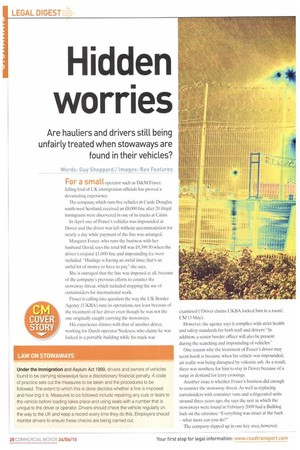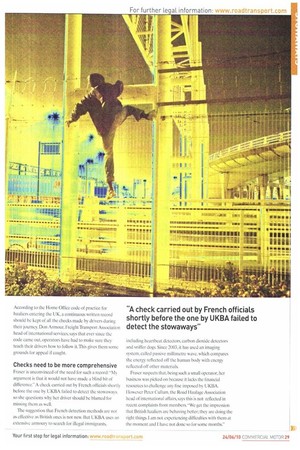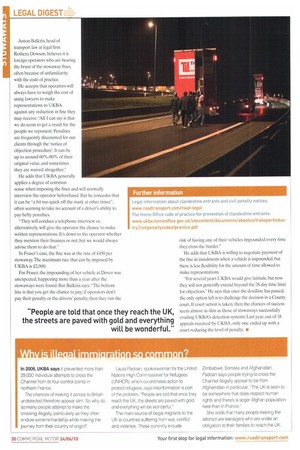Hidden worries
Page 28

Page 29

Page 30

If you've noticed an error in this article please click here to report it so we can fix it.
Are hauliers and drivers still being unfairly treated when stowaways are found in their vehicles?
Words: Guy Sheppard / Images: Rex Features
For a small operator such as D&M Fraser, falling foul of UK immigration officials has proved a devastating experience.
The company, which runs five vehicles in castle Douglas, south-west Scotland, received an £8,000 fine after 20 illegal immigrants were discovered in one of its trucks at Calais.
In April one of Fraser's vehicles was impounded at Dover and the driver was left without accommodation for nearly a day while payment of the fine was arranged.
Margaret Fraser, who runs the business with her husband David, says the total bill was £9,399.50 when the driver's original £1,000 fine and impounding Ice were included. "Haulage is having an awful time; that's an awful lot of money to have to pay," she says.
She is outraged that the fine was imposed at all, because of the company's previous efforts to counter the stowaway threat, which included stopping the use of curtainsiders for international work.
Fraser is calling into question the way the UK Border Agency (UKBA) runs its operations, not least because of the treatment of her driver even though he was not the one originally caught carrying the stowaways His experience chimes with that of another driver, working for Dutch operator Nedexco, who claims he was locked in a portable building while his truck was examined ('Driver claims UKBA locked him in a room', CM 13 May).
However, the agency says it complies with strict health and safety standards for both staff and drivers: "In addition, a senior border officer will also be present during the searching and impounding of vehicles."
One reason why the treatment of Fraser's driver may seem harsh is because, when his vehicle was impounded, air traffic was being disrupted by volcanic ash. As a result, there was nowhere for him to stay in Dover because of a surge in demand for ferry crossings.
Another issue is whether Fraser's business did enough to counter the stowaway threat. As well as replacing curtainsiders with container vans and refrigerated units around three years ago, she says the unit in which the stowaways were found in February 2009 had a Bulldog lock on the entrance. "Everything was intact at the back — what more can you do?"
The company slipped up in one key area, however. According to the Home Office code of practice for hauliers entering the UK, a continuous written record should be kept of all the checks made by drivers during their journey. Don Armour. Freight Transport Association head of international services, says that ever since the code came out, operators have had to make sure they teach their drivers how to follow it.This gives them some grounds for appeal if caught.
Checks need to be more comprehensive Fraser is unconvinced of the need for such a record: "My argument is that it would not have made a blind bit of difference:' A cheek carried out by French officials shortly before the one by CKBA failed to detect the stowaways. so she questions why her driver should be blamed for missing them as well.
The suggestion that French detection methods are not as effective as British ones is not new. But L.:KBA uses an extensive armoury to search for illegal immigrants, including heartbeat detectors, carbon dioxide detectors and sniffer dogs. Since 2003, it has used an imaging system, called passive millimetre wave, which compares the energy reflected off the human body with energy reflected off other materials.
Fraser suspects that, being such a small operator, her business was picked on because it lacks the financial resources to challenge any fine imposed by LIKBA. However Peter Cullum, the Road Haulage Association head of international affairs, says this is not reflected in recent complaints from mernbers."We get the impression that British hauliers are behaving better; they are doing the right things. I am not experiencing difficulties with them at the moment and I have not done so for some months" Anton Balkitis, head of transport law at legal firm Rothera Dowson, believes it is foreign operators who are bearing the brunt of the stowaway fines, often because of unfamiliarity with the code of practice.
He accepts that operators will always have to weigh the cost of using lawyers to make representations to UKBA against any reduction in fine they may receive. -All I can say is that we do seem to get a result for the people we represent. Penalties are frequently discounted for our clients through the 'notice of objection procedure'. It can be up to around 60%-80% of their original value, and sometimes they are waived altogether."
He adds that UKBA generally applies a degree of common sense when imposing the fines and will normally interview the operator beforehand. But he concedes that it can be "a bit too quick off the mark at other times", often seeming to take no account of a driver's ability to pay hefty penalties "They will conduct a telephone interview or, alternatively, will give the operator the chance to make written representations. It's down to the operator whether they mention their finances or not, but we would always advise them to do that."
In Fraser's case, the fine was at the rate of £450 per stowaway. The maximum rate that can be imposed by UKBA is £2,000.
For Frascr, the impounding of her vehicle at Dover was unexpected, happening more than a year after the stowaways were found. But Balkitis says: "The bottom line is that you get the chance to pay; if operators don't pay their penalty or the drivers' penalty, then they run the risk of having one of their vehicles impounded every time they cross the border."
He adds that UKBA is willing to negotiate payment of the fine in instalments when a vehicle is impounded, but there is less flexibility for the amount of time allowed to make representations.
"For several years UKBA would give latitude, but now they will not generally extend beyond the 28-day time limit for objections." He says that once the deadline has passed, the only option left is to challenge the decision in a County court. If court action is taken, then the chances of success seem almost as slim as those of stowaways successfully evading UKBA's detection systems. Last year, out of 18 appeals received by UKBA, only one ended up with a court reducing the level of penalty. •












































































































































